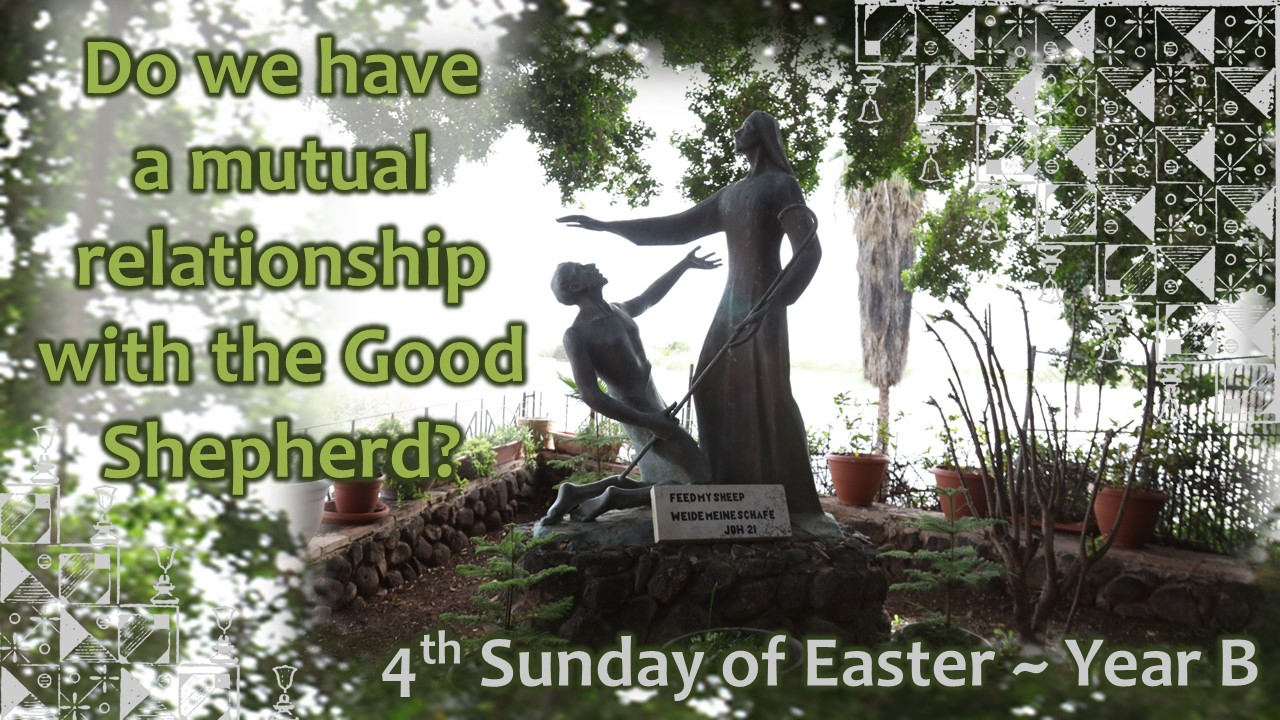
4th Sunday of Easter – Year B ~ April 21, 2024
MUTUAL RELATIONSHIP WITH THE SHEPHERD
There was once a Shakespearean actor who was known everywhere for his one-man shows of readings and recitations from the classics. He would always end his performance with a dramatic reading of Psalm 23. Each night, without exception, as the actor began his recitation – “The Lord is my Shepherd, I shall not want. the crowd would listen attentively. And then, at the conclusion of the Psalm, they would rise in thunderous applause in appreciation of the actor’s incredible ability to bring the verse to life.
But one night, just before the actor was to offer his customary recital of Psalm 23, a young man from the audience spoke up. “Sir, do you mind if tonight I recite Psalm 23?” The actor was quite taken back by this unusual request, but he allowed the young man to come forward and stand front and center on the stage to recite the Psalm, knowing that the ability of this unskilled youth would be no match for his own talent.
With a soft voice, the young man began to recite the words of the Psalm. When he was finished, there was no applause. There was no standing ovation as on other nights. All that could be heard was the sound of weeping. The audience had been so moved by the young man’s recitation that every eye was full of tears. Amazed by what he had heard, the actor said to the youth, “I don’t understand. I have been performing Psalm 23 for years. I have a lifetime of experience and training – but I have never been able to move an audience as you have tonight. Tell me, what is your secret?”
The young man quietly replied, “Well sir, you know the Psalm… I know the Shepherd.”
We continue our faith journey to grow in mutual relationship with the Lord during this Season of Easter. The Season of Easter is a season of cherishing the gift of life and mystery of resurrection. Last Sunday we reflected that Jesus came to his disciples and invited them to touch and see him to believe that he is truly risen from the dead and gives peace to all of us. This Sunday is called Good Shepherd Sunday, and we are invited to reflect on the qualities of the Good Shepherd and our relationship with the Good Shepherd as the story above mentions “I know the Shepherd”.
Good Shepherd Sunday invites us each year to rediscover, with ever new astonishment, how Jesus defined himself, reading it again in the light of his passion, death, and resurrection. “The good shepherd lays down his life for the sheep”; these words are wholly fulfilled when Christ, freely obeying the will of the Father, is immolated on the Cross. The significance that He is “the Good Shepherd” thus becomes completely clear: He gives life, He offered his life in sacrifice for us all: for you, for you, for you, for me, for everyone! And for this reason, He is the Good Shepherd!
Christ is the true shepherd, who fulfils the loftiest model of love for the flock: He freely lays down his own life, no one takes it from Him, but He gives it for the sheep. In open opposition to false shepherds, Jesus presents himself as the one true shepherd of the people. A bad shepherd thinks of himself and exploits the sheep; a good shepherd thinks of the sheep and gives himself.
In the words of Holy Father Pope Francis “In the figure of Jesus, the Good Shepherd, we contemplate the Providence of God, his paternal solicitude for each one of us. He does not leave us on our own! The result of this contemplation of Jesus the true and good Shepherd, is the exclamation of poignant astonishment that we find in the Second Reading “Beloved: See what love the Father has given us, that we should be called children of God; and that is what we are”. It is truly a surprising and mysterious love, for by giving us Jesus as the Shepherd who gives his life for us, the Father has given us all the greatest and most precious that He could give us. It is the purest and most sublime love, for it is not motivated by necessity, is not conditioned on accounting, is not attracted by a self-interested desire for exchange. Before this love of God, we feel immense joy and we open ourselves to recognizing how much we have freely received”. Isn’t an amazing reflection by Pope Francis?
No one can be a shepherd without knowing the sheep and neither without relationship. In the Book of Ezekiel, we can find two types of shepherds: first the false shepherd who are not worried about the sheep but themselves. Prophet Ezekiel prophesy against them in these words “Thus says the Lord God: Ah, you shepherds of Israel who have been feeding yourselves! Should not shepherds feed the sheep? You eat the fat, you clothe yourselves with the wool, you slaughter the fatlings; but you do not feed the sheep. You have not strengthened the weak, you have not healed the sick, you have not bound up the injured, you have not brought back the strayed, you have not sought the lost, but with force and harshness you have ruled them. So, they were scattered, because there was no shepherd; and scattered, they became food for all the wild animals. My sheep were scattered, they wandered over all the mountains and on every high hill; my sheep were scattered over all the face of the earth, with no one to search or seek for them”. Of course, these shepherds are rejected by God who seek only their own pleasures.
Secondly the Good Shepherd has a mutual relationship with his sheep because he not only knows them but sheep on the other hand know him as well. The Prophet Ezekiel explains the qualities of the Good Shepherd in this way “For thus says the Lord God: I will search for my sheep and will seek them out. As shepherds seek out their flocks when they are among their scattered sheep, so I will seek out my sheep. I will rescue them from all the places to which they have been scattered on a day of clouds and thick darkness. I will bring them out from the peoples and gather them from the countries and will bring them into their own land; and I will feed them on the mountains of Israel, by the watercourses, and in all the inhabited parts of the land. I will feed them with good pasture, and the mountain heights of Israel shall be their pasture; there they shall lie down in good grazing land, and they shall feed on rich pasture on the mountains of Israel. I will be the shepherd of my sheep, and I will make them lie down, says the Lord God. I will seek the lost, and I will bring back the strayed, and I will bind up the injured, and I will strengthen the weak, but the fat and the strong I will destroy. I will feed them with justice.
As for you, my flock, thus says the Lord God: I shall judge between sheep and sheep, between rams and goats: Is it not enough for you to feed on the good pasture, but you must tread down with your feet the rest of your pasture? When you drink of clear water, must you foul the rest with your feet? And must my sheep eat what you have trodden with your feet, and drink what you have fouled with your feet?”
In Jesus, the prophesy of Prophet Ezekiel is being fulfilled “I will set up over them one shepherd, my servant David, and he shall feed them: he shall feed them and be their shepherd”. Jesus being Good Shepherd always have compassion for his sheep “He saw them and had compassion on them because they were sheep without the shepherd”. The whole Psalm 23 reflects on the qualities of the Good Shepherd and his relationship with his sheep. This Psalm shows the heart of the Good Shepherd. The Heart of the Good Shepherd is not only the Heart that shows us mercy but is itself mercy. There the Father’s love shines forth; there I know I am welcomed and understood as I am; there, with all my sins and limitations, I know the certainty that I am chosen and loved. Contemplating that heart, I renew my first love: the memory of that time when the Lord touched my soul and called me to follow him, the memory of the joy of having cast the nets of our life upon the sea of his word.
The Heart of the Good Shepherd tells us that his love is limitless; it is never exhausted, and it never gives up. There we see his infinite and boundless self-giving; there we find the source of that faithful and meek love which sets free and makes others free; there we constantly discover anew that Jesus loves us “even to the end” to the very end, without ever imposing. The Heart of the Good Shepherd reaches out to us, above all to those who are most distant. There, the needle of his compass inevitably points, there we see a particular “weakness” of his love, which desires to embrace all and lose none.
All of us have our weaknesses and sins. But let us go deeper: what is the root of our failings, those sins, the place we have hid that “treasure” that keeps us from the Lord? Are we listening to him? Do we try to know him as he knows us? It is necessary to follow the Good Shepherd. We are called to be shepherd in our walk of life to guide, help and support one another. Let me conclude my reflection with the following true story which invites us to use our time, talent, and treasure to help other in their needs.
There is a beautiful prayer by Judith which really speaks about the protection of God towards his people “For your strength does not depend on numbers, nor your might on the powerful. But you are the God of the lowly, helper of the oppressed, upholder of the weak, protector of the forsaken, savior of those without hope. Please, please, God of my father, God of the heritage of Israel, Lord of heaven and earth, Creator of the waters, King of all your creation, hear my prayer! Make my deceitful words bring wound and bruise on those who have planned cruel things against your covenant, and against your sacred house, and against Mount Zion, and against the house your children possess. Let your whole nation and every tribe know and understand that you are God, the God of all power and might, and that there is no other who protects the people of Israel but you alone!”
St. Gregory the Great reflecting on the image of Christ the Good Shepherd says “I am the good shepherd. I know my own—by which I mean, I love them—and my own know me. In plain words: those who love me are willing to follow me, for anyone who does not love the truth has not yet come to know it. My dear brethren, you have heard the test we pastors have to undergo. Turn now to consider how these words of our Lord imply a test for yourselves also. Ask yourselves whether you belong to his flock, whether you know him, whether the light of his truth shines in your minds. I assure you that it is not by faith that you will come to know him, but by love, not by mere conviction, but by action. John the evangelist is my authority for this statement. He tells us that anyone who claims to know God without keeping his commandments is a liar. Consequently, the Lord immediately adds: As the Father knows me and I know the Father; and I lay down my life for my sheep. Clearly, he means that laying down his life for his sheep gives evidence of his knowledge of the Father and the Father’s knowledge of him. In other words, by the love with which he dies for his sheep he shows how greatly he loves his Father”.
He continues to say “My sheep hear my voice, and I know them; they follow me, and I give them eternal life. Shortly before this he had declared: If anyone enters the sheepfold through me, he shall be saved; he shall go freely in and out and shall find good pasture. He will enter a life of faith; from faith he will go out to vision, from belief to contemplation, and will graze in the good pastures of everlasting life. So, our Lord’s sheep will finally reach their grazing ground where all who follow him in simplicity of heart will feed on the green pastures of eternity. These pastures are the spiritual joys of heaven. There is the elect look upon the face of God with unclouded vision and feast at the banquet of life for ever more”.
Jesus the Good Shepherd has painted us on his own heart with his own blood which he shed on the Cross to give us eternal life.
Once upon a time, there were some sheep. Their shepherd had bought and paid for them, and he took good care of them. They were valuable to him. If they were dorky and got themselves stuck in a rut somewhere, he got them out. If they were thirsty, he led them to water. If they were hungry, he led them to new pastures with fresh grass. The wolves knew if they got near the sheep when the shepherd was around, it would be slim pickin’s that night. So, the wolves watched and waited for the right time. The day finally came. The shepherd had to attend a wedding, and he left his flock in the care of a few hired hands. The sheep were confused. The hired hands sounded different from the shepherd. They used different words. They used sticks, too. They smiled while snarling, causing even greater confusion to the sheep.
Where was the shepherd who loved them? The hired hands told them THEY were the “new boss in town.” Everything they said was directly ordered by the shepherd, so the sheep better obey, or the shepherd would be angry with them when he got back. The sheep loved their shepherd, and he had never been angry with them before. But what if the hired hands were right? The sheep didn’t want to upset their beloved shepherd. They must put on their best behavior to please the hired hands, because that would please the shepherd. The hired hands said so. And everyone knows hired hands are smarter than sheep. Instead of taking them to clear, fresh water from the bubbling streams, the hired hands took them to old, recycled water regurgitated from used cisterns. Instead of taking them to new grass from moist pastures, the hired hands took them to dusty hills that had already been cleared by other animals.
The sheep grew thin and tired and somewhat sickly, but the hired hands told them “it was through the process of being crushed that the flower would become a perfume.” And “you little sheepies must die to your desires for clean air, water, and grass because that’s just selfish and unworthy of your shepherd.”
And “your hearts are desperately wicked, and who can know them? Certainly not you. You deserve hellfire. Be grateful for what you’ve got.” Sigh. Those hired hands were so wise. Who could speak against such humble wisdom? They were the shepherd’s representatives, after all. So, the sheep submitted quietly to the hired hands. This was the exact cocktail the wolves had been waiting for. One night, they snuck into the yard where the sheep were sleeping in their fold. The wolves whimpered and whined, making such a fuss they caught the attention of the hired hands.
The hired hands considered. If they tried to fight the wolves, they might be attacked themselves and lose their reputation in town, not to mention the potential for future jobs. That would never do. So, they came up with a plan. Why not let the wolves in? Why not let them pick off the weakest sheep slowly, over time, so nobody would notice? I mean, who needs the weak sheep anyway? Survival of the fittest, right?
It was perfect! This way, only the strong, most impressive, most cooperative sheep would live, and the rest would be weeded out. Why, they could even give the rebellious sheep who kept bleating (so annoying) over to the wolves to be “taken care of.” Plus, the wolves would never personally attack the hired hands! By golly, it was a fool proof plan!
So that’s what they did. Any sheep who noticed what was happening had to keep her bleats to herself, or she’d be wolf food that night. Yes, it was best to stay quiet. Pretend the wolves weren’t among them, controlling every thought they had, every step they took, every sound they made. The wolves would share their kills with the hired hands, and the hired hands grew fat off the blood of the sheep.
Do we have a mutual relationship with the Good Shepherd?
Other Sermons In This Series
HOLY TRIDUUM YEAR – C ~ APRIL 17-20, 2025
April 16, 2025

REFLECTION FOR ALL SUNDAYS YEAR B ~ AUGUST 2024
July 30, 2024

Be On Guard | November 28, 2021
November 28, 2021

